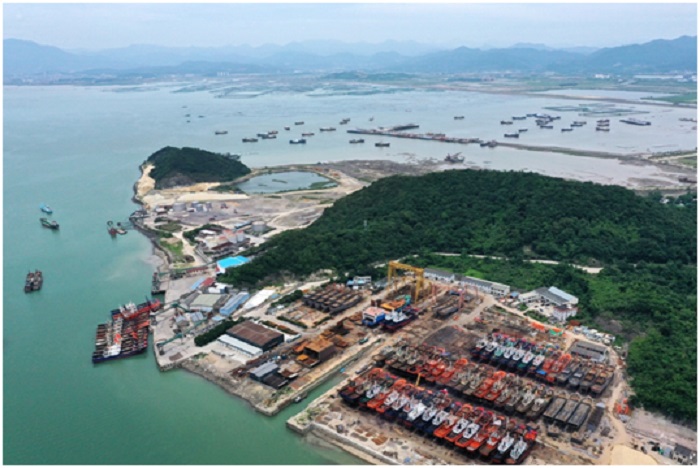



China’s domestic tourism is regaining vitality during the summer. According to a report released by Ctrip, China’s leading online tourism service platform, over 4,000 travel agencies have launched domestic tour products on the platform since the country resumed trans-provincial group tourism in mid-July, doubling that before the reboot.
On August 7, a traveler surnamed Xu and his friends from Suzhou, East China’s Jiangsu Province, traveled to Ninghai county, Ningbo, East China’s Zhejiang Province to enjoy their holiday on the beach.
They rented a boat and went for offshore fishing with local fishermen, and had a seafood feast with what they captured on the sea. The experience both satisfied their taste buds and offered them fresh excitement.
“Boat meals were reserved half a month ago. If tourists want to book tables now, it’s a game of luck,” said said Ge Xin, an executive of the visitor center of Ninghai Bay in Ninghai county.
According to Ge, 60 recreational fishing boats have been full up and working in shift in recent days. Nearly 1,000 tourists were received in Hengshan Island alone, and the business is even better than that during the same period of last year, Ge introduced.
Other coastal areas in Ningbo, such as Xiangshan, Ninghai, Fenghua and Yinzhou, have also rolled out tour products to attract tourists.
July and August are usually the best time of the year to visit the grasslands. “Me and my friends are planning a road trip to Inner Mongolia. Some are planning the route and some researching on hotels. We are all excited about the tour,” said Li Muge, an employee of an Internet company in Beijing.
To embrace nature has become a choice of more and more people when they plan a trip since the outbreak of COVID-19.
During a recent weekend, the Wudang Mountains scenic spot in Shiyan, Central China’s Hubei Province, received nearly 10,000 tourists, and it was hard to get a room in the homestay hotels near the scenic spot.
Many other tourism attractions in Hubei have also witnessed a quick recovery since trans-provincial group tours were resumed. Forest parks and wetland parks are particularly popular.
Safety and comfort are tourists’ biggest concerns during the COVID-19 pandemic. China’s Ministry of Culture and Tourism has reminded people to ensure personal protection during travels in the summer and choose safe, healthy, and green tours.
To guarantee the safety and health of tourists, local authorities and tourist sites have both stepped up efforts in epidemic control and prevention in management and services.
Since the outbreak of the COVID-19,tourist attractions in Wulong district, Southwest China’s Chongqing municipality, have paid special attention to the prevention and control of the spread of the pandemic and made great efforts to guarantee the safety of tourists and a pleasant tourism experience for them, said Li Jianguo, deputy general manager of a tourism agency in Wulong district.
“Besides routine measures like health QR code and regular disinfection, scenic spots have launched real-name reservation,” Li said.
“In addition, tourists also need to have their QR codes scanned when taking shuttles at scenic spots, so that possible infections can be traced in a timely manner. So far, there has been no confirmed COVID-19 case spotted in Wulong district’s tourist attractions,” Li disclosed.
Wulong district is known for the spectacular scenery in its world natural heritage sites and top-level national tourist attractions, such as Tiansheng Sanqiao scenic area, Wulong Furong Cave, and the Fairy Mountain national forest park.
“Since late July, these scenic areas have seen a notable growth in the number of visitors, with the figure in certain scenic spots reaching up to 70 percent of the level before the COVID-19,” Li noted.


The Executive and members of the.


The Acting Director, FCT Directorate of.


President Bola Ahmed Tinubu has been.



Barely a month after resignation of.


An Abuja based Legal Practitioner, Osuagwu.



Convener of Equitable Remedy, Mrs. Magaret.


Contractors handling the contract for city.


Nigerian government may have concluded plans.


The Diplomatic Correspondents Association of Nigeria.


A rights group, “Follow Me Talk.
Leave a Comment